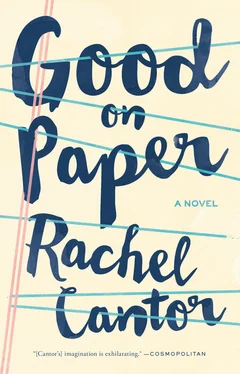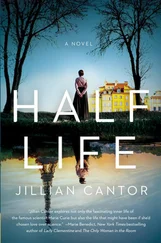Where is this photo of Andrea?
I laughed and scanned the photo I’d taken of Andi at her desk, then faxed it to Romei, together with a note:
Yeah, whatever. So Dante accepts commissions, so he is inspired by “real” people, so he has a “muse,” whatever that means. So he stops writing woe-is-me poems. This doesn’t mean he changes — not really. This doesn’t mean he learns how to love .
Then I said, What the hey, and mailed the photo to Aunt Emma, or Elisheva, as she now called herself, though this would mean receiving a photo of her in return — in the scarf she wore so the West Bank wind wouldn’t wig out her wig.
Which inspired me to find my daughter. She was at the dining room table, coloring in her Insects of the World coloring book.
What kind of bug is that? I asked.
A green bug.
Is that its scientific name? I asked.
Mom!
Up, child! I exclaimed. It’s time to exercise your limbs. Come!
Where’s Ahmad?
In Brooklyn, fixing his car. Come! First-to-get-to-Joe’s-while-also-checking-both-ways-before-she-crosses-the-street gets a happy-face cookie!
Once at Joe’s, I had to grab Andi to keep her from stepping on the twins, who were playing with the Barnard student’s shoelaces. I got a double for me and a coconut dandy for Nate, who, oddly, was nowhere to be found.
Andi ate her cookie while leaning into me on our Riverside Park bench.
It’s pretty great living here, isn’t it? I said, my arm around her. When she didn’t reply, I elaborated: the playground, Joe’s, Cohn’s Cones.
Can I have an ice cream later? she said.
I considered that a victory. Sure, I said. Then she asked for, and I produced, a Handiwipe from my mother’s bag of tricks.
Bye! she shouted, waving furiously, as if she were off on a polar expedition.
Don’t run, I cried pointlessly, thinking of her cast. Then I arranged everything on my bench — Romei’s pages, Andi’s pail and shovel, her Observations Notebook, my iced mocha, Andi’s Wonder Woman Band-Aids, a jumbo pack of goldfish.
The Hudson glimmered. I closed my eyes, heard the trickle of the fountain behind me, imagined myself as Esther on her bench, smiled to think that a singular Romeo might someday watch me from a tree: Benny, for example, his long legs dangling from a branch, playing a flute like an oversize sprite.
Down girl! The only woman Benny wanted anywhere near his flute was narcoleptic Marie.
So what was Romei’s task now? At this point in Vita Nuova , Dante addresses poems to his muse. He runs into her at a party — his entire body throbs, he is abandoned by his spirits, he leans against a fresco for relief. The ladies laugh at his distress, not understanding the cause of his transformation. But this sighting occasions more poems — poems about romantic anguish in which the figure of Pity frequently appears.
Then Beatrice injures him by not saying hello. Heartbroken, he tells the ladies who surround him that while his joy once lay in her greeting, now he must locate it in something that cannot be withdrawn. His new path? Words of praise! He resolves to write not of romantic anguish but of the perfections of Beatrice.
Like most of us, Dante finds change easy to talk about, but the prospect overwhelms him. He dithers, he’s beset by fear and trembling. Finally, while traveling by a “clear stream,” he receives a first line … The result: a canzone describing Beatrice’s perfections.
So what would Romei do? Esther was his muse, presumably. He’d praise her, right?
Not exactly.
I’d thought that Esther and Romei, once “liberated” from her husband, would be speechless. In fact, their first act is to dine al fresco in Trastevere, Esther’s Samsonite propped against a wall covered with obscene chalk drawings. Romei avoids her eye, tosses crumbs to urchin cats, sketches nonsense syllables onto a paper tablecloth. He imagines himself a poet Picasso, whose scrawled words will one day pay for dinner, for he is down to his last lire.
Esther, meanwhile, cannot sit still: she spills wine, complains of pains in her hip, gives her ragú back to the waiter, insists she’d ordered carbonara , though she doesn’t eat pork. She tastes her penne , vomits them onto the cobblestones.
Yes, more penne , not filled by Esther this time, but voided, spennar , like Icarus.
You will live with me, Romei says, as if this is a comfort. She wipes her mouth on the tablecloth, looks at him in horror. He looks back at her in dwindling light as if from a mountain top, imagines words falling from her mouth, heavy and broken — and from these on the tablecloth he fashions poems. A blotch between lines three and four represents a smear of sugo, between six and seven, a drop of wine, or so a sidebar explains.
In the days that follow, Esther’s languor, attractive in a lover, is revealed as pathological passivity: she is by turns depressed, hysterical, withdrawn. The passion that brought them together proves no stronger than a wishbone, snapped in two by Esther’s loss, the rigors and banalities of everyday life. Esther refuses Romei her bed, brings men to the flat — foreigners, thieves, CIA operatives. She acts not out of desire, nor to make Romei jealous, but to give form to her despair. When the men finish their business, she sends them off and crawls onto Romei’s lap, babbling, her words slippery and disconnected. He croons at her — in Italian, Romanian too. Her babbling, his crooning (increasingly insincere), neither understood by the other, is the subject of another poem, a long-limbed Whitmanian knock-off, the wind knocked out of every line. The Song of Me-Me-Me taken to its solipsistic extreme.
Housekeeping is a nightmare. Esther can’t cook, her habits are slovenly. She takes the pittances Romei earns from interpreting, from acting as guide to visiting journalists, and spends them on imported Rice Krispies, fat loaves of American bread. Their phone is disconnected: she’s been calling overseas, calling everyone she knows, trying to find her husband. No one will help: even her mother has disowned her. Romei shouts at her in Italian: get up! get up! Curled on a couch, unmoving, she asks in English if she should take up crochet. Croce ? Romei wonders. Croce ? The cross? Does his Jewish wife wish to convert?
They know so little about each other. Esther is allergic to cigarettes; Romei always smokes when he writes. Esther is a morning person; Romei likes to sleep in. Romei, despite his slow start, is swollen with ambition; Esther has only her past.
She is difficult, complains of wrist pain, leg pain, she sells her mother’s pearls, forgets to attend job interviews. Awaking with a rash across her nose and cheeks, she stays in bed, pretends she is a child in Connecticut. Romei grows tired of her babbling, her complaints, her wild-eyed wandering. There are circles under her eyes, as if she hasn’t slept, yet she spends whole days in bed. Romei urges her to continue her translation. It’s a lie, she says, the Song of Songs , translation, all of it a lie. He agrees but thinks her lazy. One morning she presents him with a handful of her hair — did it fall out or did she pull it? — he finds he doesn’t care: it’s her fault, surely, something she has brought upon herself.
Their bond is a negative one: held together by the drama that brought them together, his guilt and sense of obligation, her inability to imagine anything different, they live a life of crossed purposes, missed opportunities, swallowed outrage and, not incidentally, squalor. But Romei writes. Out of this impossible relationship, out of their perpetual misunderstanding and disappointment, Romei, no longer “blocked,” discovers the anti-vocabulary for his art. He writes, she wanders, falls to the ground, he writes. She is his muse, his anti-muse.
Читать дальше












